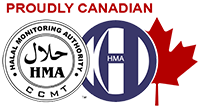Islam is more than just a religion. It is a style of living governed by norms and etiquette in all aspects of existence. Food regulations are particularly significant because food is an integral element of daily living. Muslims are required to eat for survival and good health, not to live for the sake of eating. Like prayer, fasting, almsgiving, and other religious acts, eating is considered a form of worship in Islam. A Muslim eats to keep a robust and healthy body to give his knowledge and effort to the betterment of society. Muslims are expected to make an effort to achieve the highest nutritional quality possible.
In a Hadith, it is stated that Allah will reject a person’s prayer if his meal is Haram. According to another Hadith, the flesh that has been nurtured with Haram is more deserving of hellfire.
Canada is a multi-religious and multicultural country. As a result, the topic of Halal-Haram in food becomes a problem since some non-Muslims may not comprehend the issues and sensitivities of Muslims. This is exacerbated by the fact that many Canadian firms are either unaware of Muslim restrictions or choose to disregard them as minor.
Because these two concepts are so important to Islamic beliefs and dietary requirements, it is critical for all businesses that provide products and services to follow and follow the Halal guidelines. However, simply following the regulations will almost certainly not be enough. Companies must obtain a Halal Certificate to inform clients/customers that they meet Halal criteria and that Haram sources and practices are not being used. Halal Certification is useful for a wide range of enterprises due to the fact that the meat halal product segment is attracting not just Islamic but also non-Islamic consumers.
Many long-established businesses worldwide are working on getting a certified Halal status, realizing the value and significance of this Certification. Over the last few decades, this process has crossed regional and religious boundaries, spreading its wings to the far reaches of the globe and trickling into brands that were not originally meant to follow Halal guidelines. In brief, having a Halal certificate would help your company acquire the trust of its customers and will assist you in staying away from Haram.
Halal Certification guarantees that a company’s products or services meet Islamic dietary or lifestyle guidelines. Halal Certification’s main purpose is to assist businesses worldwide in adhering to health, safety, and humanitarian standards in general, as well as Islamic standards in particular. A recognized entity awards a Halal Certificate to an organization that meets the Halal standards regarding its products or services. HMA expands the number of ‘Halal certified’ and branded options available to this market. This starts with consumer demand, prompting product owners and manufacturers to seek Halal meat Toronto. As a result, a large supply chain network of Halal-certified ingredients is required to meet the expectations of manufacturers, who can subsequently provide customers with completed Halal products. The Halal certification procedure and the HMA Canada that give the certification work tirelessly to accomplish the Halal standards’ goal of “not causing needless harm or suffering to fellow creatures.”
Each company recognizes the necessity to have a Halal label on product packaging following completion of the Halal certification process as part of the service agreement terms and conditions with Halal Monitoring Authority (HMA).
HMA also offers the added benefit of including Halal-certified client corporate logos and web links on its website as a value-added service. This informs HMA website visitors and Halal-conscious shoppers about their business’s certification and product standards.
The displayed Halal emblem provides another line of Halal traceability. You’re extending your digital presence and triggering search engine optimization (SEO) overtime when HMA displays your company’s logo on their website with a link to your website. Your company can start appearing in traffic searches for Halal products if you have a good SEO program in place. All of these perks come at no additional expense.
Do not be afraid to promote your product to its utmost potential in the marketplace. Put yourself ahead of the competition by introducing your customers to the world of Halal Certification and its numerous benefits.
While Halal Certification has been around for decades and is well recognized, Islam is expanding globally, which means more Muslims and Halal consumers. This provides a constant stream of new possibilities to educate and gain new brand loyalty from intelligent consumers. We must recognize that Halal shoppers are actively looking for product labels before making a purchase. Why should they only hunt for “Kosher” labels when “Halal” labels are also available? Include the Halal emblem on your product packaging to continue to present people with more options. You have already laid the foundation; now it’s time to build on it.




